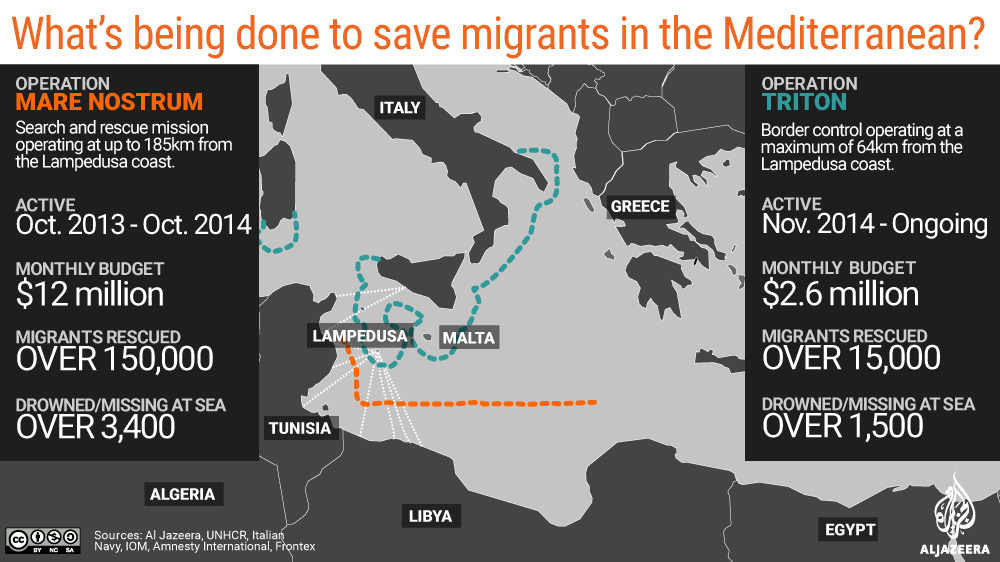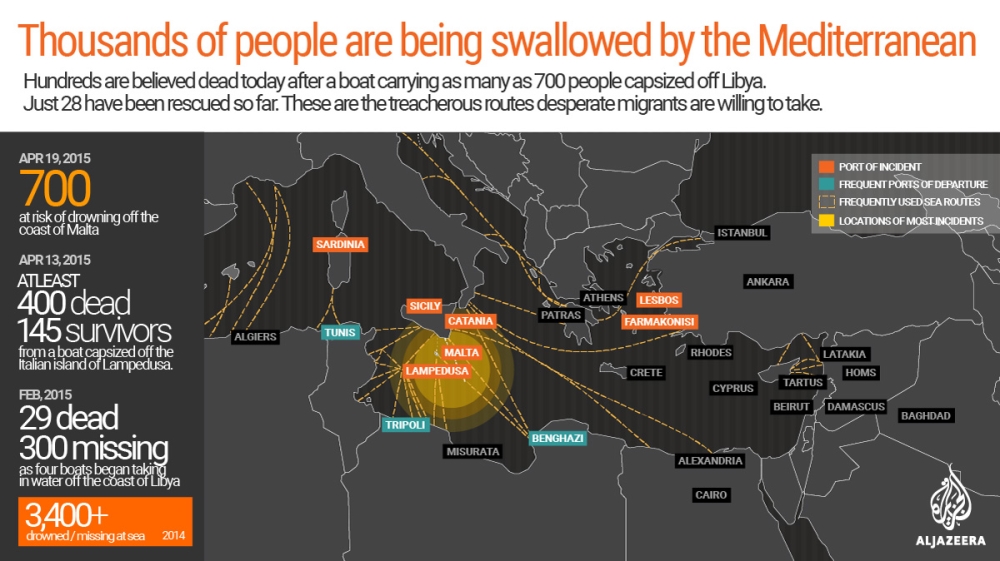EU officials mull military action to stop migrants
Destroying boats used by traffickers off North African coast before they are loaded among the options being considered.

Defence ministers from five European Union countries are meeting for talks on a military campaign to stop human trafficking and reinforce the region’s defences against the flow of migrants from North Africa.
Officials from France, Germany, Poland, Italy and Spain on Sunday will use events commemorating the 70th anniversary of the liberation of Lorient, western France, to discuss how to battle the influx of migrants to Europe, which has already cost thousands of lives.
Keep reading
list of 4 items‘Mama we’re dying’: Only able to hear her kids in Gaza in their final days
Europe pledges to boost aid to Sudan on unwelcome war anniversary
Birth, death, escape: Three women’s struggle through Sudan’s war
The ministers are also expected to discuss Europe’s common defence strategy, including “possible options for European [military] action” after some of the most deadly migrant shipwrecks ever seen in the Mediterranean this year, according to the French defence ministry.
The meeting comes as key European governments said they would resist a separate EU plan to force the bloc’s 28 member states to share the burden of hosting refugees.
More than 5,000 refugees have died over the past 18 months as boats operated by smugglers have capsized off Libya’s coast, causing alarm among European leaders seeking to halt the flow.
Federica Mogherini, EU foreign policy chief, is set to present a plan to the UN Security Council on Monday that would see the UN lead military operations against the people smugglers.
Controversial option
The most controversial option under discussion would set out to destroy the boats used by the traffickers before they were loaded with migrants and sent out on the perilous journey to European shores.
Most set sail from Libya, where the breakdown of government since the overthrow of Muammar Gaddafi has allowed people traffickers to operate with impunity.
But critics say military action in Libyan waters or to stop a vessel flying the country’s flag without an international mandate would break international law.
Ban Ki-moon, UN secretary-general, has also criticised the plan, saying that destroying boats could affect the livelihoods of Libyan fishermen, who may be forced into dealings with the smugglers to make ends meet.

For now, Brussels is concentrating on stopping unflagged boats and sharing intelligence on traffickers, according to EU sources. That could include information gathered from radar, aerial surveillance and wiretaps.
The aim is “to identify the points of departure, the security situation on the ground” and establish a multinational team of planning officers, a military source in Paris told the AFP news agency.
Meanwhile, key European governments are resisting a separate EU plan – to be unveiled on Wednesday – that would force the bloc’s 28 member states to share the burden of hosting refugees.
Powerful member states such as Britain and the eastern Europeans are opposing the plan, with Viktor Orban, Hungary’s prime minister, calling the proposal “mad”.
“The EU needs a permanent system for sharing the responsibility for large numbers of refugees and asylum seekers among member states,” AFP news agency reported quoting the draft of the proposal from the EU’s executive seen.
The quota plan is being driven personally by Jean-Claude Juncker, the European Commission head, with the strong backing of Germany, European officials said.
The proposal will go before EU heads of government and heads of state at their June 25-26 summit.
EU-wide quota
With the flow of migrants expected to grow in the summer “the proposal will include a distribution mechanism for persons in clear need of international protection to ensure a fair and balanced participation of all member states to this common effort”, the draft proposal said.
In the final proposal on Wednesday, sources said Juncker may fix at 20,000 the EU-wide quota for refugees when several European governments wanted a vague requirement and based on voluntary basis.
|
|
The 20,000 would then be spread among the member states according to country’s population, GDP, unemployment level and historical track record as a host for asylum seekers.
“Six countries – Germany, Britain, France, Sweden, Italy, Belgium – take on board 80 percent of asylum seekers in the EU,” said Guy Verhofstadt, former Belgian prime minister and MEP.
“Thirteen countries do nothing, take zero responsibility.”
Hungary is one member state that has faced a huge influx of refugees recently, mainly from Kosovo, but also Syria, Iraq and Afghanistan. Many move on to Germany or Austria.
“The European idea that somebody allows refugees into their own country and then distributes them to other member states is mad and unfair,” Orban said on Friday.
Italy, Greece and Malta, the three countries that receive the majority of migrants, mostly from Libya, have harshly criticised EU migrant policy and called on other states for help.
The relentless stream of migrants to Italy alone this year is on track to surpass the 170,000 rescued at sea by the country in 2014.
